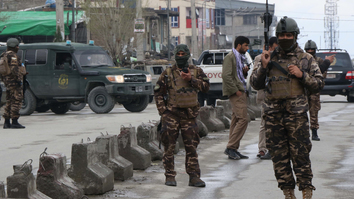KABUL -- A dozen Afghan Sikhs gathered Monday (June 20) in a room behind the charred ruins of their temple in Kabul, hoping to be swiftly evacuated having finally given up on the country of their birth.
"There is no future for us here. I have lost all hope," said Ragbir Singh, who was wounded when gunmen stormed the temple Saturday in an attack claimed by the "Islamic State of Iraq and Syria" (ISIS).
"Everywhere we are under threat."
In a message posted on its Amaq propaganda site, ISIS said that the Saturday attack targeted Hindus and Sikhs and the "apostates" who protected them.
![Sikh Afghan Manmohan Singh Sethi (right) is interviewed by AFP in Kabul on June 20. [Ahmad Sahel Arman/AFP]](/cnmi_st/images/2022/06/21/35879-000_32cv3xw-585_329.jpg)
Sikh Afghan Manmohan Singh Sethi (right) is interviewed by AFP in Kabul on June 20. [Ahmad Sahel Arman/AFP]
![Members of the Sikh community walk past a damaged building following an ISIS attack on a Sikh temple in Kabul on June 18. [Ahmad Sahel Arman/AFP]](/cnmi_st/images/2022/06/21/35880-000_32cq6e2-585_329.jpg)
Members of the Sikh community walk past a damaged building following an ISIS attack on a Sikh temple in Kabul on June 18. [Ahmad Sahel Arman/AFP]
![A general view of the charred remains of a Sikh temple in Kabul on June 20, two days after an ISIS attack. [Ahmad Sahel Arman/AFP]](/cnmi_st/images/2022/06/21/35881-000_32cv3xv-585_329.jpg)
A general view of the charred remains of a Sikh temple in Kabul on June 20, two days after an ISIS attack. [Ahmad Sahel Arman/AFP]
Two Afghans were killed, and at least seven others wounded in the raid.
Many Sikhs had sought refuge at the complex, living communally or in family groups scattered around the building.
For Manmohan Singh Sethi, who was born in Afghanistan, the temple was not just a place of worship, but home to the entire Sikh community.
"This used to be the main gurdwara where we all used to meet as a family," said Sethi, who is in his 70s.
ISIS targets
Gunmen first fired at the main gate of the complex, killing a guard, before storming inside, shooting and throwing grenades, survivors said.
Minutes later a car bomb exploded outside the complex, shattering walls and windows of nearby buildings.
When the raid began, some escaped through a back door and took refuge in nearby buildings.
In the ensuing chaos, Singh -- who was on the fourth floor of the complex -- fell to the ground, injuring his legs and a hand.
Several rooms and the main prayer hall of the complex have been heavily damaged by bullets, grenades and a fire that engulfed a section during the raid.
"The United States condemns the cowardly attack on the Afghan Sikh community's gurdwara in Kabul that claimed innocent lives, including a Sikh worshiper," US Special Representative for Afghanistan Thomas West tweeted on Monday.
"My deepest condolences to the families of the victims. Vulnerable minorities must be protected."
The Sikh community has been targeted before.
In March 2020, at least 25 people were killed when gunmen stormed a different temple in Kabul.
And in 2018 at least 19 people, most of them Sikhs, were killed by a suicide bombing in Jalalabad.
Both attacks were claimed by ISIS, which regularly targets members of Afghanistan's minority communities -- including Shia and Sufis.
Leaving Afghanistan
The number of Sikhs and Hindus living in Afghanistan had dwindled to about 200 by late last year, compared with about half a million in the 1970s.
Most of those who remained were traders involved in selling herbal medicines and electronic goods brought from India and Pakistan.
The attack came days after a delegation from New Delhi visited Kabul to discuss the possibility of reopening the Indian embassy.
Indian government sources told AFP in Delhi that emergency visas had been given to about 100 Afghan Hindus and Sikhs, but Sethi said no one in the frightened community was aware of the news.
He said the community was now unsure of where it could pray for its future.
"If we all gather to perform rituals at a specific place, we might face another such incident," he said.
"We have been attacked thrice already... We can't be careless."
"The latest incident has impacted us in a big way," said Sethi.
"Afghanistan is my homeland, and I never wanted to leave... but now I am leaving."








At least 920 people have been killed and more than 600 injured in an earthquake in Afghanistan's Paktika, Khost, and Nangarhar provinces. The figures were confirmed by the Taliban's Deputy Minister of State for Disaster Management, Sharafuddin Muslim, at an emergency news conference in Kabul today. He said the quake had destroyed thousands of homes and villages, with the worst casualties happening to women and children in Paktika's Barmal district. This great tragedy has befallen Afghans in the current dire situation and has deeply saddened the people. People are so poor that they can't afford to eat at home. So what will happen to the people whose houses were destroyed by the earthquake? International charities should work with an active, transparent, and honest organization to help the earthquake victims and the people. If left unmanaged, the injured people will die. Afghanistan cannot control this situation in the current situation. It has been ten months now that people have been unemployed, and these houses have collapsed. It is hoped that international aid agencies will step in and provide emergency assistance.
Reply1 Comment